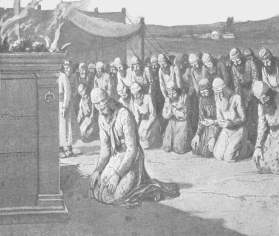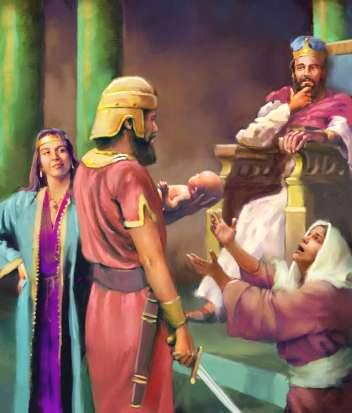|
|
|
|
 CHAPTER 3
CHAPTER 3
 Solomon loves the Lord and keeps his commandments—The Lord appears
to Solomon and promises him a wise and an understanding heart—He
judges between two harlots, and determines maternity of a child.
Solomon loves the Lord and keeps his commandments—The Lord appears
to Solomon and promises him a wise and an understanding heart—He
judges between two harlots, and determines maternity of a child.
|
||
|
1
¶ AND Solomon made
aaffinitya with
bPharaoh king of Egypt, and took Pharaoh's daughter, and
brought her into the ccity of David, until he had made an
end of building his own dhouse, and the house of the LORD,
and the ewall of Jerusalem round about.
2 Only the people sacrificed in high places, because there was no ahouse builtunto the name of the LORD, until those days. 3 And Solomon loved the LORD, walking in the astatutes of David his father: only he bsacrificed and burnt incense in high places. 4 And the king went to aGibeon to sacrifice there; for that was the great bhigh place: a thousand burnt offerings did Solomon offer upon that altar. |
1a
Affinity Like his father David, Solomon help
secure Israel's place in the political world by entering into political
marriages. Such was the case with the daughter of Pharoah. Solomon married
her to solidify Israel's political position with Egypt. 1ki0246
and he turned his attention to international relations. Certainly the Lord
didn't instruct him to take Pharaoh's daughter.
At this time the other nations of the Middle East were weak. This allowed Solomon and his father before him to become strong. 1 - City of David Distinguished from Jerusalem which had been a stronghold of the Jebusites 2sa0507ff. 2 - Sacrificed in the high places The Lord was to designate places for sacrifices de1210f. Before that time sacrifices were made in various places jg0625, 1sa0710. Also see the next verse. 4 - Went to Gibbeon See on 2ch0101. 
|
1a HEB a marriage alliance b 1 Kgs 7:8; 1 Kgs 9:16 (16,24); 1 Kgs 11:1 c 1 Kgs 2:10 d 1 Kgs 7:1 e 1 Kgs 9:15 (15,19) 2a D&C 124:28 (25-48) 3a D&C 136:2 b 1 Ne. 5:9; 1 Ne. 7:22 4a Josh. 9:3; 1 Chr. 21:29; b 1 Chr. 16:39;
|
Solomon's Gift of Wisdom Is Obtained |
||
|
5
¶ In aGibeon the LORD bappeared to
Solomon in a cdream by night: and God said, Ask what I
shall give thee.
6 And Solomon said, Thou hast shewed unto thy servant David my father great mercy, according as he walked before thee in truth, and in righteousness, and in uprightness of heart with thee; and thou hast kept for him this great kindness, that thou hast given him a son to sit on his throne, as it is this day. 7 And now, O LORD my God, thou hast made thy servant king instead of David my father: and I am but a alittle child: I know not how to go out or come in. 8 And thy servant is in the midst of thy people which thou hast chosen, a agreat people, that cannot be bnumbered nor counted for multitude. 9 Give therefore thy servant an aunderstanding bheart to judge thy people, that I may cdiscern between good and bad: for who is able to judge this thy so great a people? |
5
- Gibeon 6 mi. (10 km) northwest of
Jerusalem near Gibeah. See Canaan map.
The wilderness tabernacle was there 2ch0103.
Solomon had held a feast of celebration for the nation there. For the Gibeonites,
see jos0923.
5 - In a dream God had used dreams before ge1512, ge2812ff, ge3124. He had spoken to David through prophets 2sa0702, 2sa2411 and by priests 1sa2309. 9 - An understanding heart See pr0910, pr0407. |
5a
1 Kgs 9:2 b 1 Kgs 11:9; 2 Chr. 1:7 (7-12) D&C 110:8 (7-8) c TG Dreams 7a 1 Chr. 22:5; 1 Chr. 29:1 3 Ne. 9:22; 3 Ne. 11:37-38; 8a 2 Sam. 7:23 b Gen. 13:16; Abr. 3;14 9a TG Understanding b TG Heart c TG Discernment, Spiritual
|
|
10
And the speech pleased the Lord, that Solomon had asked this thing.
11 And God said unto him, Because thou hast asked this thing, and hast not asked for thyself long life; neither hast asked ariches for thyself, nor hast asked the life of thine benemies; but hast asked for thyself cunderstanding to discern judgment; 12 Behold, I have done according to thy words: lo, I have agiven thee a bwise and an understanding heart; so that there was none like thee before thee, neither after thee shall any arise like unto thee. 13 And I have also given thee that which thou hast not asked, both ariches, and honour: so that there shall not be any among the kings like unto thee all thy days. 14 And if thou wilt walk in my ways, to keep my statutes and my acommandments, as thy father David did walk, then I will lengthen thy days. |
- |
11a
Jacob 2:18-19;
Alma 39:14 D&C 6:6-7; D&C 11:7 b D&C 98:23 b 2 Ne. 21:2 12a TG Guidance, Divine b 1 Kgs 4:29-31; 1 Kgs 5:12 2 Ne. 28:15; Jacob 6:12 Mosiah 29:11; Morm. 9:28 JS-H 1:11 (11-13) 13a 1 Kgs 10:23-25; Matt. 6:33 14a D&C 54:6
|
| 15 And Solomon awoke; and, behold, it was a dream. And he came to Jerusalem, and stood before the aark of the covenant of the LORD, and offered up burnt offerings, and offered peace bofferings, and made a feast to all his servants. | - |
15a
2 Sam. 6:17;
2 Chr. 1:4 b TG Sacrifice
|
The Wisdom of Solomon Propetically Tested |
||
|
16 ¶ Then came there two
womena, that were
harlotsb, unto the king, and
stood before him.
17 And the one woman said, O my lord, I and this woman dwell in one housea; and I was delivered of a child with her in the house. 18 And it came to pass the third day after that I was delivered, that this woman was delivered also: and we were together; there was no stranger with us in the house, save we two in the house. 19 And this woman's child died in the night; because she aoverlaid ita. 20 And she arose at midnight, and took my son from beside me, while thine handmaid slept, and laid it in her bosom, and laid her dead child in my bosom. 21 And when I rose in the morning to give my child suck, behold, it was dead: but when I had considered it in the morning, behold, it was not my son, which I did bear. 22 And the other woman said, Nay; but the living is my son, and the dead is thy son. And this said, No; but the dead is thy son, and the living is my son. Thus they spake before the king.
Covenant of the Firstborn 1) The Covenant of God's Firstborn, Jehovah the Savior of mankind, came down from the beginning through the fathers to father Abraham and included the blessing and right of ancestry to the Messiah. 2) Ephraim was blessed by Jacob as his son of the firstborn, the bearer of the covenant of the fathers (See also Bible Dictionary ~ Jacob). 4) It is Ephraim who the Lord pronounces as being his son of the covenant of the firstborn. The Covenant was not divided between Judah and Ephraim, but shared in ancestry to Messiah. |
16a
two women In an allegorical frame of reference, these two women
represent the two houses or kingdoms of Israel, the house of Leah and the
house of Rachel. The house of Leah being the Kingdom of Judah and the house
of Rachel being the Kingdom of Israel.
16b harlots The word here 'zonoth' or 'zanah' is commonly translated as being associated with prostitution. Yet both Adam Clarke and John Wesley in their commentaries point out that an optional translation from the Chaldee source would be 'tavern-keepers', 'innkeepers' or 'victuallers'. That is the keeping of a 'public house'. While this is not necessarily distinguishable from being a 'house of ill-repute', it does give an optional consideration. Remember in Joshua 2;1 that Rahab was such a 'public house victualler' or 'innkeeper', which makes sense that travelers would lodge there as did the two Israelite spies. Harlot is consistent with the consideration that both houses or kingdoms of Israel, Israel and Judah, both played the harlot before their God, yet both still laid claim to the 'living child', the Messiah. 17a I and this women dwell in one house Both Leah and Rachel where of one house, the House of Jacob or Israel. 19a this woman's child died in the night; because she overlaid it Judah 'overlaid' or killed the Messiah, yet they still lay claim to being the 'true parent' of the living Messiah.
|
19a OR laid upon it
There is ample evidence that Christ is the legal and rightful descendant of the house of Joseph through Ephraim (See text Messiah ben David ~ Messiah ben Joseph). Briefly the case is that Boaz, who was of the tribe of Judah, acted only as the 'surrogate' father of Obed, the firstborn son of Ruth. Boaz was raising up seed to the dead (Ruth 4:5,10 & Deuteronomy 25:5-10). Therefore Obed was in truth the legal and rightful seed of the house of Mahlon and his father Elimelech, both Ephrathites or Ephraimites. In Israel, kinsmen and kinswomen are often of differing tribes as was Mary of the house of David an Elisabeth her cousin, who was of the tribe of Levi.
In the traditions of Israel, the Jews, which have remained, it is Rachel who is said to be the 'Mater Dolorosa' of Israel. It is Rachel who is the 'Sorrowing Mother' for Israel. Through the legal right of the Law of God as set out in the Law of Moses, it is Rachel who is the true mother of the house of David (See the text Messiah ben David ~ Messiah ben Joseph). |
|
23 Then said the king, The
one saith, This is my son that liveth, and thy son is the dead: and the
other saith, Nay; but thy son is the dead, and my son is the living.
24 And the king said, Bring me a sword. And they brought a sword before the king. 25 And the king said, Divide the living child in two, and give half to the one, and half to the other. 26 Then spake the woman whose the living child was unto the king, for her bowels yearned upon her son, and she said, O my lord, give her the living child, and in no wise slay it. But the other said, Let it be neither mine nor thine, but divide it. 27 Then the king answered and said, Give her the living child, and in no wise slay it: she is the mother thereof. |
-

Image
© 2002, Goodsalt.com
|
|
| 28 And all Israel heard of the judgment which the king had judged; and they feared the king: for they saw that the awisdom of God was in him, to do judgment. | - |
28a
1 Ne. 21:2
|
|
|
|
|
|
|